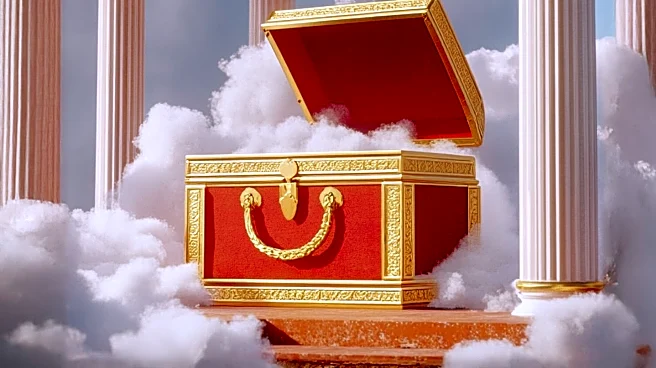What's Happening?
The myth of Pandora, the first woman in Greek mythology, is a tale of curiosity and its consequences. Created by the gods as a punishment for humanity, Pandora was given a box and instructed not to open
it. Her curiosity led her to release all the evils into the world, leaving only hope inside. This story, recorded by Hesiod, highlights the theme of curiosity and its double-edged nature. Pandora's tale has been interpreted in various ways, reflecting cultural attitudes towards women and the complexities of human nature.
Why It's Important?
Pandora's myth is significant for its exploration of curiosity and the human condition. It serves as a cautionary tale about the dangers of unchecked curiosity, suggesting that while curiosity drives progress, it must be tempered with wisdom. The story also reflects ancient Greek views on women, portraying Pandora as a source of trouble, which has been interpreted as a reflection of patriarchal attitudes. Additionally, the myth symbolizes the balance of good and bad in life, with Pandora's box representing the hardships of existence and the enduring presence of hope.
What's Next?
The myth of Pandora continues to be a subject of interpretation and analysis, with modern perspectives offering new insights. Feminist scholars have reexamined the story, arguing that Pandora has been unfairly vilified and that her tale reflects the suppression of female agency. The myth also serves as a metaphor for modern challenges, such as technological advancements and their potential consequences. As society grapples with issues of curiosity and responsibility, Pandora's story remains relevant, offering lessons on the balance between exploration and caution.
Beyond the Headlines
Beyond its immediate narrative, Pandora's myth explores deeper themes of human nature and the complexities of existence. It highlights the ethical dimensions of curiosity and the responsibilities that come with knowledge and power. The story suggests that life is a balance of good and bad, and it is our task to navigate these dualities with grace and hope. In the modern context, Pandora's box serves as a metaphor for the potential risks and rewards of innovation, urging caution and foresight in the pursuit of progress.









